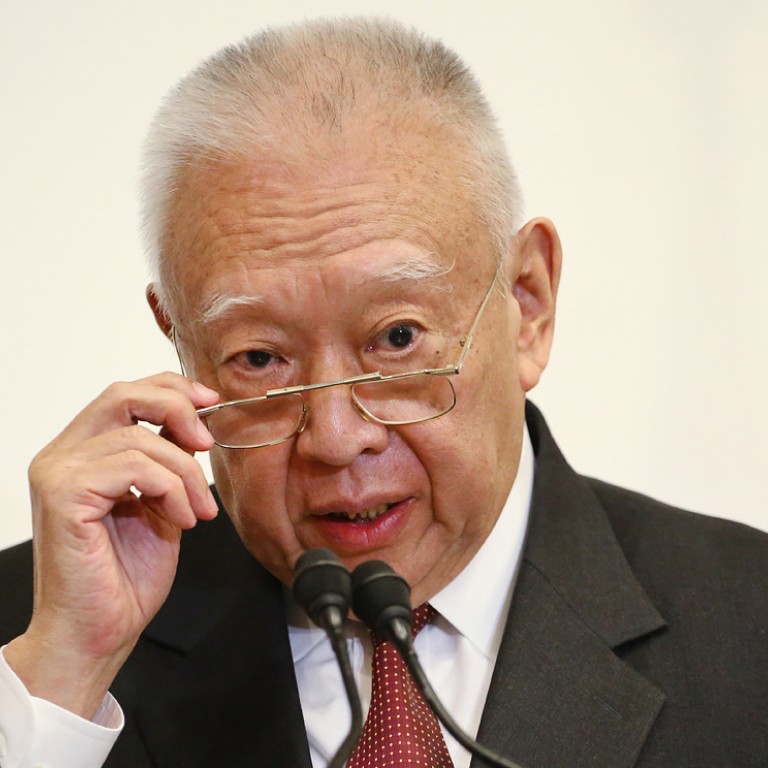
Occupy protests must end - but Beijing won't use force, says ex-HK leader Tung Chee-hwa
Former chief executive says Beijing will not resort to force as it retains confidence in police and C. Y. Leung, but protests should end anyway
Beijing will not use military force to disperse Occupy Central protesters as it is confident the Hong Kong police force can handle the situation, the city's first chief executive says.
The protesters ought to go home nevertheless, Tung Chee-hwa said, as their action had dealt a blow to the city's economy, livelihoods and rule of law, and had torn the community apart.
"The occupation is approaching one month and now is the time to end it," he said yesterday, on the 27th day of the sit-ins. "The negative impact of Occupy will be beyond our imagination and Hongkongers will have to foot the bill eventually."
Tung, who was chief executive from 1997 to 2005 and is now vice-chairman of the Chinese People's Political Consultative Conference, sought to dispel concerns about whether Beijing had set a deadline.
"The [People's Liberation Army] will not be sent to Hong Kong streets," he said. "I have full confidence in the Hong Kong police in handling the protests."
Asked whether that was the central government's position, he said: "Yes".
The Occupy protests recall a movement that mainland students initiated 25 years ago to push for a democratic China. That movement ended abruptly when the PLA moved in on protesters at Beijing's Tiananmen Square on June 4, 1989, in a bloody crackdown.
"I met Chief Executive Leung Chun-ying recently and I know he wants a peaceful solution," Tung said.
Leung had done well in handling the protests, he said, and would be able to complete his five-year tenure, up to 2017, as he had Beijing's trust.
Tung was meeting the media for the first time since Occupy began on September 28. He defended Leung's receipt of £4 million (HK$50 million) from Australian company UGL, news of which broke days after Occupy began.
Leung sealed the deal with UGL, which was in the midst of buying the insolvent DTZ, a month after announcing his candidacy in November 2011 for the chief executive election. He was then a director of DTZ, a London-listed property services firm.
"I personally took time to understand the issue and came to the conclusion that there was no problem with C.Y.'s integrity on the matter," Tung said. "It was a normal business activity."
Liberal Party leader James Tien Pei-chun urged Leung to consider resigning. "Residents are ignoring court injunctions [to disperse] and pan-democrats are being uncooperative," the long-time critic of Leung said. "How is he going to govern?"
Tien named Chief Secretary Carrie Lam Cheng Yuet-ngor as a suitable successor, as "she can talk to the Federation of Students and pan-democrats and is better received on the streets".
But Tung called for continued dialogue instead.
In an emotional appeal to student protesters, he added: "Your aspirations have been heard and I fully understand what you are fighting for. I hope you will listen to me, an elderly senior, that it is time to go home."
The former shipping tycoon said he understood that both hotel bookings and credit card spending had dropped 20 to 30 per cent in recent weeks.
"It's the fourth quarter, when companies start deliberating pay rises and hiring. In the light of the uncertainty … they may wait and see. Foreign companies may also hold back their decisions to set up offices and make investments in Hong Kong."
Tung said Hong Kong accounted for 16 per cent of the country's gross domestic product in 1997 but it was just 3 per cent now. "Hong Kong wouldn't have been able to maintain prosperity without the motherland's support. There is an urgent need to rebuild trust between Hong Kong and the mainland," he said.

